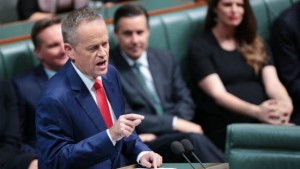Home » Commentary » Opinion » Sorry, Bill. You misjudged Australia’s religious faith
· The Daily Telegraph
 All those ‘quiet Australians’ can breathe more easily now that Bill Shorten’s attempt to launch a moral crusade under the guise of identity politics has been decisively rejected by voters.
All those ‘quiet Australians’ can breathe more easily now that Bill Shorten’s attempt to launch a moral crusade under the guise of identity politics has been decisively rejected by voters.
Remember that a Shorten government wasn’t only going to go after your hip pocket.
Also in the ALP line of fire were the 66 per cent of Australians who declared a religious affiliation in the last census.
It’s hard now to remember that 10 years ago, religion barely made it into the news headlines. Back then, it was generally accepted that what a person believed about God was an entirely private matter.
Times have changed. First, we argued about the rights of Muslim women to wear the headscarf. Then we argued about religious exemptions to the same sex marriage law.
And in the last week of the election campaign, Bill Shorten publicly impugned Scott Morrison’s Christian faith and made the Prime Minister’s religious beliefs a matter of political contention.
At issue, of course, was Christian teaching about homosexuality — something about which Christians, themselves, are fiercely divided (and Morrison has never made his views on this matter public).
Shorten’s claim that Morrison’s religious beliefs made him unsuitable to serve as Prime Minister of Australia not only ran strongly against Aussie principles of decency; it also showed complete contempt for Section 116 of the Constitution — which forbids any religious test being imposed as a qualification for public office under the Commonwealth.
The Green-Left has long made the mistake of thinking that religion in Australia is in decline and that it is now only to be found in a few remaining parts of the country ‘marked by bigotry and racist hatred’.
Shorten made the mistake of assuming that those ‘pockets of resistance’ would quickly crumble in an ideological battle waged in the name of identity politics.
Religious schools were put on notice that the longstanding exemptions they had been afforded under anti-discrimination laws would be rescinded by an incoming Shorten government.
No religious school could refuse to hire a teacher holding views conflicting with the school’s religion. Nor could a school ‘expel gay students’ — as if any school principal would do such a thing.
The forces of identity politics, already on the march in Australia, would have gained momentum under a Shorten government that would have ensured all dissenting voices would be ostracised and silenced.
We know now that Bill Shorten and his Green-Left allies badly misjudged the character of Australian voters. The so-called ‘inner city elites’ preached a transformative moral vision of the country. But that vision — which ridicules and dismisses the views of so many Australians — would have traduced the ethos of religious institutions and prevented them from upholding the very tenets of their faith.
Bill Shorten showed — although he denied it — that a Labor government would trample on the fundamental human right to religious freedom.
Under a Shorten government, it was always going to be inevitable that the spirit of freedom and the spirit of religion were going to march in completely opposition directions in our country.
Religious leaders from all the major faiths were understandably anxious about the impact they knew this division was bound to have on the cohesiveness of our society.
And it is clear that many ordinary Australians — ‘Morrison’s Middle’, as they have now been dubbed — were also anxious about the militant atheism that ridicules the religious faith by which they live.
What is hard to understand is how Shorten and the Green-Left failed to see this. Earlier this month, a YouGov Galaxy survey found a remarkable 75 per cent of those surveyed agreed that freedom of thought, conscience and belief needed protecting. Only 5 per cent disagreed.
The number of those calling for greater protections for religious freedom reflects not only the mainstream live-and-let-live attitude that characterises Australian society.
It also reflects the tremendous importance that those who have fled the threat of persecution, torture and death in other countries place on religious liberty in our open and liberal democratic country.
Yet the election shows that, in its calls for compassion, defence of human dignity, and protection of the vulnerable, Labor has actually lost touch with vast areas of Australia — including its historic heartlands.
Progressive politics remains popular in wealthy inner city electorates where virtue-signalling about everything from climate change to gender fluidity comes at a relatively small cost.
But in our suburbs, our regional towns and cities, and in the bush, such virtue-signalling cuts away at the very fabric of social life where people are bound by ties of kin and community.
In his victory speech on Saturday night, the newly elected Prime Minister closed by saying “God bless Australia” — a phrase seldom heard on the lips of our politicians.
Yet for millions of Australians concerned about the freedom to live and order their lives in accordance with their own beliefs about God, it was a phrase that resounded their hearts.
Peter Kurti is a Senior Research Fellow at the Centre for Independent Studies and Adjunct Associate Professor of Law at the University of Notre Dame Australia
Sorry, Bill. You misjudged Australia’s religious faith